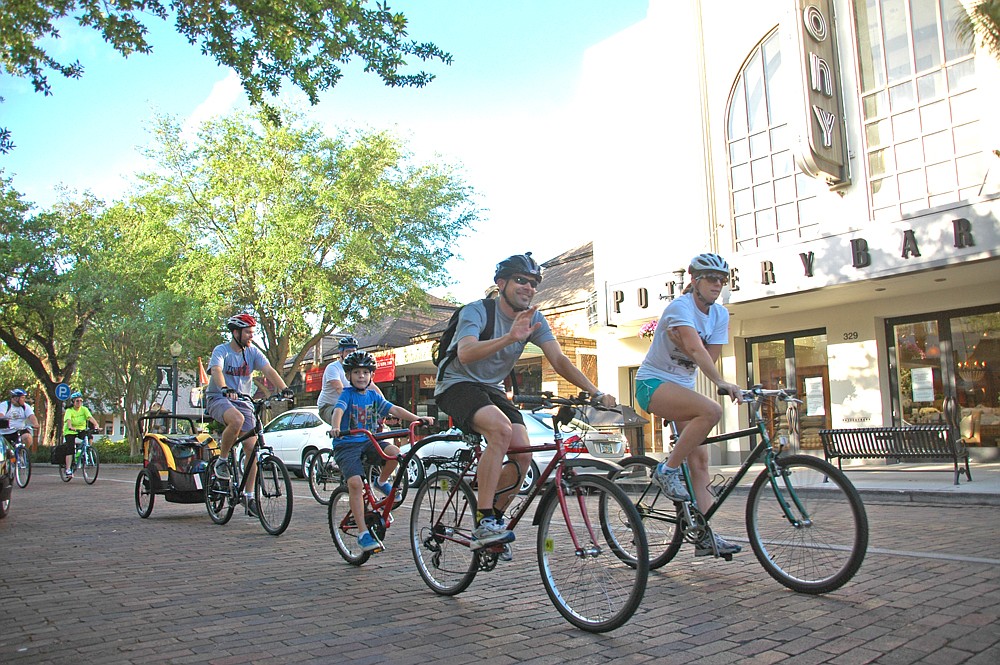- April 22, 2024
-
-
Loading

Loading

Nearly 100 bicycles rode off on their own in Winter Park in 2014; or at least they didn’t leave home with their owners. But a tiny weapon being popularized at a nearby college may be a tricky way to help get stolen bikes back, or at least discourage thieves from taking them in the first place.
With such a sprawling campus, and a student head count that’s near 60,000, the University of Central Florida is crawling with cyclists zipping across campus. With so many bikes to tempt would-be thieves, theft has become a problem, despite the fact that the UCF Student Government Association offers free bike sharing.
To help curb the thefts, UCF police are using some creative solutions, including implementing a not-so-secret bait bike program to catch thieves red-handed.
The technology is based on the same tracking devices used to monitor shipping containers at major ports, adapted for use on bicycles.
The program started with just two bikes in late 2011 and now has several bait bikes including cruisers, mountain bikes, BMX and hybrid road bike styles. The bikes are valued between $300 and $500 and are maintained by a local bike shop to keep them in perfect working order.
UCF PD uses bikes valued in this range to make it possible to charge apprehended bike thieves with a felony rather than a misdemeanor.
In Florida, felony larceny carries a potential sentence of one to five years in jail and fines of up to $5,000, in addition to court costs and probation.
Most offenders end up with a hefty fine, time served and probation, said officer Pete Stephens of the UCF Police Department.
The program is seeing successes. Last year, there were 78 reported bike thefts on campus and 27 of those were bait bikes, resulting in 19 arrests.
“From our standpoint, with such a high concentration of bikes on campus, this program has been very, very effective,” Stephens said.
All the bait bikes were secured with locks, and placed strategically around campus at locations where thefts have been common.
Each location is tagged in the GPS software program, which runs constantly on dispatch computers and on some officers’ cell phones.
Once a bait bike moves, the GPS signal alerts dispatch of the movement and officers are sent to the location to recover the bike and hopefully make an arrest.
Bait bikes have turned up at nearby pawnshops, inside cars, even as far away as the East Colonial Best Buy store.
In one case Stephens said, a bike thief “borrowed” her new ride near the library and headed across campus toward the arena, straight toward some off-duty cops who were providing extra security for a high school graduation event. Not wanting to interfere with campus police, the officers tried to ignore the rider, hoping UCF PD would get there first, but she forced their hand when she stopped to ask them a question, making it impossible for them to ignore the situation any longer.
Busted!
Stephens noted that the most commonly stolen bikes are mountain bikes, but BMX bikes are often targeted for parts, if not the entire bike.
Winter Park has its own problems with bike theft. According to the Winter Park Police Department, 92 bikes were stolen from various locations around the city in 2014.
Unlike UCF, Winter Park does not have its own bait bike program, but they have used bait bikes from other agencies in the past, said Lt. Pam Marcum.
Stephens said some of the best ways to protect your property are to invest in solid locks, lock up at designated, well-lit racks and register your bike with authorities.
Another way more proactive riders can keep their bikes safe relies on the same tech as the police. Mounting a GPS tracking device can give cyclists the security of always knowing where their bike is, and when it’s on the move.
Devices such as the Bikespike (Bikespike.com) or Spybike (Spybike-gps.com) have smartphone-enabled apps that communicate with riders to tell them if their bike has moved, and to tell them exactly where it is. But they both require data plans or SIM cards to work.
UCF PD has been conducting outreach sessions on campus throughout the month of February to assist students in registering their bike. They also offer free engraving of a driver’s license number on bikes to assist with their return if stolen.
Although nothing has been set in stone, Winter Park is considering similar program options including a bike registry. But, Marcum said, they are only effective if cyclists choose to participate.